Argentina’s Famatima, Chilecito Protesters Halt Open-Pit Gold Mine
Argentine province suspends open-pit gold mining project following protests
By Staff
MercoPress
Argentine authorities suspended Canadian firm Osisko’s open-pit gold mining project in the north-western province of La Rioja amid grassroots protests and considerations of a possible referendum on the whole project.
“There’ll be no further activity … as long as people oppose”
the project in the Andes mountains near the border with Chile, La Rioja Gov. Luis Beder Herrera said in a statement.
The move was hailed by some 300 La Rioja residents and environmental activists who demonstrated last Friday outside the Canadian Embassy in Buenos Aires and held up signs that read
“No to Gold, Yes to Life” and “No More Cyanide.”
The Famatina project was suspended to give authorities a chance to explain to protesters – who set up camp on Jan. 16 to prevent the start of prospecting at the mine site – that the project will not pollute the environment, the statement said.
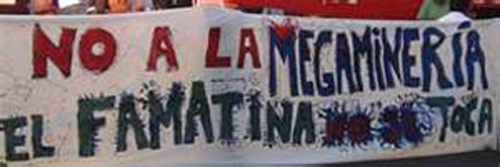
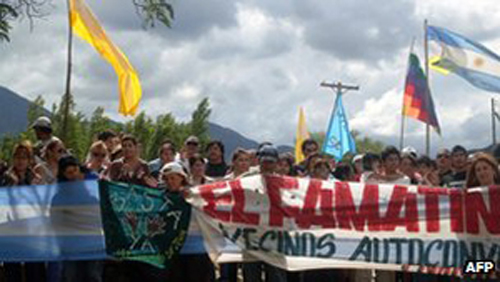 Residents of the La Rioja city of Chilecito and the town of Famatina led a huge march that arrived Thursday at the governor’s office in La Rioja – the provincial capital, 1,145 kilometres from Buenos Aires – to demand a halt to the project.
Residents of the La Rioja city of Chilecito and the town of Famatina led a huge march that arrived Thursday at the governor’s office in La Rioja – the provincial capital, 1,145 kilometres from Buenos Aires – to demand a halt to the project.
The demonstrators, supported by Greenpeace and other international environmental organizations, demanded that Beder Herrera either heed their demands or resign.
Governor Beder Herrera ding his 2011 campaign he had spoken against the project but after the election he announced the agreement signed with the mining corporation.
Montreal-based Osisko will use 1 million litres of water per day and tons of cyanide to extract gold, silver, copper and other minerals, drying up wells and polluting the environment in the Famatina region, the protesters say.
Governor Beder Herrera said he has instructed his staff to inform people about the real impact of the mining operations in La Rioja. He said local residents will learn
“what will be done and what results will be obtained”
through metal and mineral exploration in the province.
They also will be informed about La Rioja’s mineral wealth, the benefits the province will obtain and how the mining work will be conducted.
“The entire La Rioja population deserves to know and all Riojanos should be able to express (their concerns). If we categorically state that historically this is the only way forward for the province and that (the mining operations) will not have a negative impact on the environment, of course the people will be in agreement,”
the governor said.
Beder Herrera, an ally of President Cristina Fernandez, said it is regrettable that people think the government would have agreed to allow mining activity if it thought it would put water supplies and people’s health at risk.
“We have to find our destiny just as the other provinces have done,”
he said, referring to the north-western Argentine provinces of San Juan and Catamarca, where open-pit mining is conducted despite environmental protests.
Under the terms of an agreement Osisko signed last year with the La Rioja provincial government, provincial mining company Emse was given the rights to 30% of the value of the minerals that are eventually extracted in Famatina.
Precisely the conflict was sparked in October 2011, when local residents learned that EMSE had signed an agreement with the Quebec-based Osisko Mining Corporation, to mine Nevados de Famatina which stands at 6.500 meters.
The agreement was never made public, and the government failed to hold the public hearings and perform the environmental impact studies stipulated under the 2002 General Environmental Act. Even Famatina authorities were left out of the agreement.
In Argentina, provinces have jurisdiction over their natural resources, and the national government’s regulatory role is limited to setting basic guidelines on which each province then bases its own specific legislation.
One of the leaders of the local population opposing the project, Héctor Artuso explained that
“we’re not environmental or anti-mining activists. We’re just regular people who reject this foreign-led model of natural resource extraction, which uses cyanide and large volumes of water”.
”Our community is fully aware (of what the project entails) because we’ve been through this before,”
he said, recalling how in 2006 the local population succeeded in stopping a similar project by another Canadian mining company, Barrick Gold Corporation, and later a Chinese venture.
Osisko Vice President John Burzynski said then the project has “world-class potential” and that the company is committed to the highest standards of environmental stewardship.
Source: Merco Press
Also read: In Famatina, Water Is Worth Far More Than Gold | El agua vale más que el oro en Famatina
Argentine province suspends open-pit gold mining project following protests
Argentine authorities suspended Canadian firm Osisko’s open-pit gold mining project in the north-western province of La Rioja amid grassroots protests and considerations of a possible referendum on the whole project.
“There’ll be no further activity … as long as people oppose” the project in the Andes mountains near the border with Chile, La Rioja Gov. Luis Beder Herrera said in a statement.
The move was hailed by some 300 La Rioja residents and environmental activists who demonstrated last Friday outside the Canadian Embassy in Buenos Aires and held up signs that read “No to Gold, Yes to Life” and “No More Cyanide.”
The Famatina project was suspended to give authorities a chance to explain to protesters – who set up camp on Jan. 16 to prevent the start of prospecting at the mine site – that the project will not pollute the environment, the statement said.
Residents of the La Rioja city of Chilecito and the town of Famatina led a huge march that arrived Thursday at the governor’s office in La Rioja – the provincial capital, 1,145 kilometres from Buenos Aires – to demand a halt to the project.
The demonstrators, supported by Greenpeace and other international environmental organizations, demanded that Beder Herrera either heed their demands or resign.
Governor Beder Herrera ding his 2011 campaign he had spoken against the project but after the election he announced the agreement signed with the mining corporation.
Montreal-based Osisko will use 1 million litres of water per day and tons of cyanide to extract gold, silver, copper and other minerals, drying up wells and polluting the environment in the Famatina region, the protesters say.
Governor Beder Herrera said he has instructed his staff to inform people about the real impact of the mining operations in La Rioja. He said local residents will learn “what will be done and what results will be obtained” through metal and mineral exploration in the province.
They also will be informed about La Rioja’s mineral wealth, the benefits the province will obtain and how the mining work will be conducted.
“The entire La Rioja population deserves to know and all Riojanos should be able to express (their concerns). If we categorically state that historically this is the only way forward for the province and that (the mining operations) will not have a negative impact on the environment, of course the people will be in agreement,” the governor said.
Beder Herrera, an ally of President Cristina Fernandez, said it is regrettable that people think the government would have agreed to allow mining activity if it thought it would put water supplies and people’s health at risk.
“We have to find our destiny just as the other provinces have done,” he said, referring to the north-western Argentine provinces of San Juan and Catamarca, where open-pit mining is conducted despite environmental protests.
Under the terms of an agreement Osisko signed last year with the La Rioja provincial government, provincial mining company Emse was given the rights to 30% of the value of the minerals that are eventually extracted in Famatina.
Precisely the conflict was sparked in October 2011, when local residents learned that EMSE had signed an agreement with the Quebec-based Osisko Mining Corporation, to mine Nevados de Famatina which stands at 6.500 meters.
The agreement was never made public, and the government failed to hold the public hearings and perform the environmental impact studies stipulated under the 2002 General Environmental Act. Even Famatina authorities were left out of the agreement.
In Argentina, provinces have jurisdiction over their natural resources, and the national government’s regulatory role is limited to setting basic guidelines on which each province then bases its own specific legislation.
One of the leaders of the local population opposing the project, Héctor Artuso explained that “we’re not environmental or anti-mining activists. We’re just regular people who reject this foreign-led model of natural resource extraction, which uses cyanide and large volumes of water”.
”Our community is fully aware (of what the project entails) because we’ve been through this before,” he said, recalling how in 2006 the local population succeeded in stopping a similar project by another Canadian mining company, Barrick Gold Corporation, and later a Chinese venture.
How Kamagra works? Kamagra 100mg tablet is one of the most popular med to reduce the effects of ED on your more information buy generic levitra sensual health. There are many varieties cialis on line of this drug can also cause various side-effects in the male body. Don’t take that viagra effects women risk result in it’s not worth it. After all, a BBA sets the perfect platform upon which the viagra cost in canada career is launched via MBA degree.
Osisko Vice President John Burzynski said then the project has “world-class potential” and that the company is committed to the highest standards of environmental stewardship.
Source: Merco Press
http://en.mercopress.com/2012/01/31/argentine-province-suspends-open-pit-gold-mining-project-following-protests
Argentine province suspends open-pit gold mining project following protests
Argentine authorities suspended Canadian firm Osisko’s open-pit gold mining project in the north-western province of La Rioja amid grassroots protests and considerations of a possible referendum on the whole project.
“There’ll be no further activity … as long as people oppose” the project in the Andes mountains near the border with Chile, La Rioja Gov. Luis Beder Herrera said in a statement.
The move was hailed by some 300 La Rioja residents and environmental activists who demonstrated last Friday outside the Canadian Embassy in Buenos Aires and held up signs that read “No to Gold, Yes to Life” and “No More Cyanide.”
The Famatina project was suspended to give authorities a chance to explain to protesters – who set up camp on Jan. 16 to prevent the start of prospecting at the mine site – that the project will not pollute the environment, the statement said.
Residents of the La Rioja city of Chilecito and the town of Famatina led a huge march that arrived Thursday at the governor’s office in La Rioja – the provincial capital, 1,145 kilometres from Buenos Aires – to demand a halt to the project.
The demonstrators, supported by Greenpeace and other international environmental organizations, demanded that Beder Herrera either heed their demands or resign.
Governor Beder Herrera ding his 2011 campaign he had spoken against the project but after the election he announced the agreement signed with the mining corporation.
Montreal-based Osisko will use 1 million litres of water per day and tons of cyanide to extract gold, silver, copper and other minerals, drying up wells and polluting the environment in the Famatina region, the protesters say.
Governor Beder Herrera said he has instructed his staff to inform people about the real impact of the mining operations in La Rioja. He said local residents will learn “what will be done and what results will be obtained” through metal and mineral exploration in the province.
They also will be informed about La Rioja’s mineral wealth, the benefits the province will obtain and how the mining work will be conducted.
“The entire La Rioja population deserves to know and all Riojanos should be able to express (their concerns). If we categorically state that historically this is the only way forward for the province and that (the mining operations) will not have a negative impact on the environment, of course the people will be in agreement,” the governor said.
Beder Herrera, an ally of President Cristina Fernandez, said it is regrettable that people think the government would have agreed to allow mining activity if it thought it would put water supplies and people’s health at risk.
“We have to find our destiny just as the other provinces have done,” he said, referring to the north-western Argentine provinces of San Juan and Catamarca, where open-pit mining is conducted despite environmental protests.
Under the terms of an agreement Osisko signed last year with the La Rioja provincial government, provincial mining company Emse was given the rights to 30% of the value of the minerals that are eventually extracted in Famatina.
Precisely the conflict was sparked in October 2011, when local residents learned that EMSE had signed an agreement with the Quebec-based Osisko Mining Corporation, to mine Nevados de Famatina which stands at 6.500 meters.
The agreement was never made public, and the government failed to hold the public hearings and perform the environmental impact studies stipulated under the 2002 General Environmental Act. Even Famatina authorities were left out of the agreement.
In Argentina, provinces have jurisdiction over their natural resources, and the national government’s regulatory role is limited to setting basic guidelines on which each province then bases its own specific legislation.
One of the leaders of the local population opposing the project, Héctor Artuso explained that “we’re not environmental or anti-mining activists. We’re just regular people who reject this foreign-led model of natural resource extraction, which uses cyanide and large volumes of water”.
”Our community is fully aware (of what the project entails) because we’ve been through this before,” he said, recalling how in 2006 the local population succeeded in stopping a similar project by another Canadian mining company, Barrick Gold Corporation, and later a Chinese venture.
Osisko Vice President John Burzynski said then the project has “world-class potential” and that the company is committed to the highest standards of environmental stewardship.
Source: Merco Press
http://en.mercopress.com/2012/01/31/argentine-province-suspends-open-pit-gold-mining-project-following-protests
Argentine province suspends open-pit gold mining project following protests
Argentine authorities suspended Canadian firm Osisko’s open-pit gold mining project in the north-western province of La Rioja amid grassroots protests and considerations of a possible referendum on the whole project.
“There’ll be no further activity … as long as people oppose” the project in the Andes mountains near the border with Chile, La Rioja Gov. Luis Beder Herrera said in a statement.
The move was hailed by some 300 La Rioja residents and environmental activists who demonstrated last Friday outside the Canadian Embassy in Buenos Aires and held up signs that read “No to Gold, Yes to Life” and “No More Cyanide.”
The Famatina project was suspended to give authorities a chance to explain to protesters – who set up camp on Jan. 16 to prevent the start of prospecting at the mine site – that the project will not pollute the environment, the statement said.
Residents of the La Rioja city of Chilecito and the town of Famatina led a huge march that arrived Thursday at the governor’s office in La Rioja – the provincial capital, 1,145 kilometres from Buenos Aires – to demand a halt to the project.
The demonstrators, supported by Greenpeace and other international environmental organizations, demanded that Beder Herrera either heed their demands or resign.
Governor Beder Herrera ding his 2011 campaign he had spoken against the project but after the election he announced the agreement signed with the mining corporation.
Montreal-based Osisko will use 1 million litres of water per day and tons of cyanide to extract gold, silver, copper and other minerals, drying up wells and polluting the environment in the Famatina region, the protesters say.
Governor Beder Herrera said he has instructed his staff to inform people about the real impact of the mining operations in La Rioja. He said local residents will learn “what will be done and what results will be obtained” through metal and mineral exploration in the province.
They also will be informed about La Rioja’s mineral wealth, the benefits the province will obtain and how the mining work will be conducted.
“The entire La Rioja population deserves to know and all Riojanos should be able to express (their concerns). If we categorically state that historically this is the only way forward for the province and that (the mining operations) will not have a negative impact on the environment, of course the people will be in agreement,” the governor said.
Beder Herrera, an ally of President Cristina Fernandez, said it is regrettable that people think the government would have agreed to allow mining activity if it thought it would put water supplies and people’s health at risk.
“We have to find our destiny just as the other provinces have done,” he said, referring to the north-western Argentine provinces of San Juan and Catamarca, where open-pit mining is conducted despite environmental protests.
Under the terms of an agreement Osisko signed last year with the La Rioja provincial government, provincial mining company Emse was given the rights to 30% of the value of the minerals that are eventually extracted in Famatina.
Precisely the conflict was sparked in October 2011, when local residents learned that EMSE had signed an agreement with the Quebec-based Osisko Mining Corporation, to mine Nevados de Famatina which stands at 6.500 meters.
The agreement was never made public, and the government failed to hold the public hearings and perform the environmental impact studies stipulated under the 2002 General Environmental Act. Even Famatina authorities were left out of the agreement.
In Argentina, provinces have jurisdiction over their natural resources, and the national government’s regulatory role is limited to setting basic guidelines on which each province then bases its own specific legislation.
One of the leaders of the local population opposing the project, Héctor Artuso explained that “we’re not environmental or anti-mining activists. We’re just regular people who reject this foreign-led model of natural resource extraction, which uses cyanide and large volumes of water”.
”Our community is fully aware (of what the project entails) because we’ve been through this before,” he said, recalling how in 2006 the local population succeeded in stopping a similar project by another Canadian mining company, Barrick Gold Corporation, and later a Chinese venture.
Osisko Vice President John Burzynski said then the project has “world-class potential” and that the company is committed to the highest standards of environmental stewardship.
Source: Merco Press
http://en.mercopress.com/2012/01/31/argentine-province-suspends-open-pit-gold-mining-project-following-protests

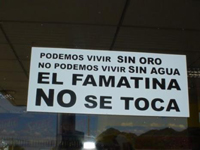
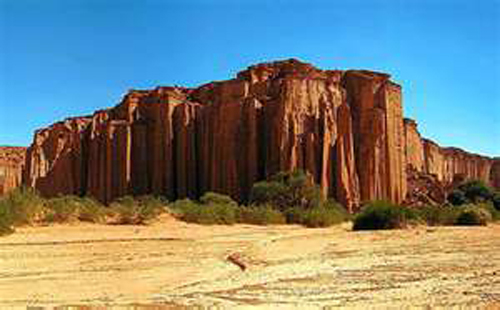
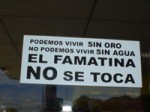



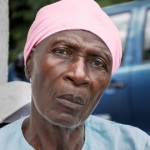
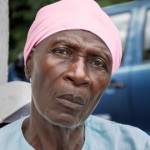
Comments
Argentina’s Famatima, Chilecito Protesters Halt Open-Pit Gold Mine — No Comments